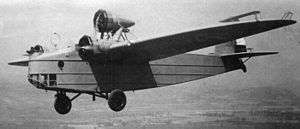Dornier Do Y
The Dornier Do Y was a German bomber of the 1930s, the second bomber design by Dornier Flugzeugwerke.
| Do Y | |
|---|---|
 | |
| A Dornier Do Y of the Royal Yugoslav Air Force | |
| Role | Bomber |
| National origin | Germany |
| Manufacturer | Dornier Flugzeugwerke |
| First flight | March 1930 |
| Primary user | Royal Yugoslav Air Force |
| Number built | 4 |
Development
Design on the aircraft began in 1930, to follow up from the other Dornier bomber prototype, the Dornier Do P. The first aircraft flew in March 1930. It was a shoulder-wing monoplane of all-metal construction with fixed tailwheel landing gear, similar to the Do P, however this model had three engines instead of four. A civil transport version was proposed as the Dornier Do U, but this was never produced.
Operational history
The Do P and Do Y were displayed in the early 1930s as freighter prototypes; they were in fact evolutionary steps towards creating the Luftwaffe's first operational bomber, the Dornier Do 11a. Two examples were produced for the Royal Yugoslav Air Force in 1931, followed by two more machines six years later. All four served with the 81st regiment at Mostar-Ortijes until replaced by the Savoia-Marchetti SM.79 in 1939. The aircraft were then relegated to transport and liaison roles until all four were captured by German forces at Kraljevo in 1941. One of them was subsequently handed over to the Air Force of the Independent State of Croatia.
Fast passenger aircraft Do 15
In 1932, Dornier worked on two aircraft with the Wnr. 243 and 244. They were originally ordered by Yugoslavia, but then cancelled. These aircraft were part of the Do K and Do Y projects. There was a request for tender by Deutsche Luft Hansa and the Reich Air Ministry for a fast passenger aircraft - which in fact was to get a fast bomber. Dornier offered the design with the new naming Dornier Do 15. The same request lead to the superior designs, Heinkel He 111 and Junkers Ju 86. This caused Dornier to develop a new design, the Dornier Do 17.[1][2]
Specifications (Do Y - 9K engines)
Data from Jane's all the World's Aircraft 1937[3][4]
General characteristics
- Crew: 4
- Length: 18.2 m (59 ft 9 in)
- Wingspan: 26.82 m (88 ft 0 in)
- Height: 6.3 m (20 ft 8 in)
- Wing area: 108.8 m2 (1,171 sq ft)
- Empty weight: 5,700 kg (12,566 lb)
- Gross weight: 8,500 kg (18,739 lb)
- Fuel capacity: 2,090 l (550 US gal; 460 imp gal) fuel in two wing tanks; 210 l (55 US gal; 46 imp gal) oil in three tanks
- Powerplant: 3 × Gnome-Rhône 9Kers 9-cylinder air-cooled radial pistonengines, 450 kW (600 hp) each at 4,050 m (13,290 ft)
- Propellers: 3-bladed metal propellers
Performance
- Maximum speed: 300 km/h (190 mph, 160 kn) at 4,000 m (13,000 ft)
- Cruise speed: 250 km/h (160 mph, 130 kn) at 4,000 m (13,000 ft)
- Landing speed: 105 km/h (65 mph; 57 kn)
- Range: 1,500 km (930 mi, 810 nmi)
- Service ceiling: 8,300 m (27,200 ft) service ceiling
- Absolute ceiling: 8,800 m (28,900 ft)
- Rate of climb: 2.7 m/s (530 ft/min)
- Time to altitude: 4,000 m (13,000 ft) in 12 minutes 30 seconds
- Wing loading: 78 kg/m2 (16 lb/sq ft)
- Power/mass: 0.15838 kW/kg (0.09634 hp/lb)
Armament
- Guns: 5x machine guns in nose, dorsal and ventral positions
- Bombs: 12 × 100 kg (220 lb) bombs carried internally in the fuselage
References
| Wikimedia Commons has media related to Dornier Do Y. |
- Nowarra, Heinz J. (1993). Die Deutsche Luftruestung 1933–1945 Vol.1 – AEG-Dornier (in German). Koblenz: Bernard & Graefe Verlag. pp. 179–187. ISBN 978-3-7637-5464-9.
- Ringlstetter, Herbert (2009). FLUGZEUG CLASSIC SPECIAL 4 (in German). München: GeraMond. ISBN 978-3897242180.
- Grey, C.G.; Bridgman, Leonard, eds. (1937). Jane's all the World's Aircraft 1937. London: Sampson Low, Marston & company, ltd. p. 268c.
- "Dornier Y". www.histaviation.com. Retrieved 17 April 2018.
Further reading
- World Aircraft Information Files. Brightstar Publishing, London. File 892 Sheet 26